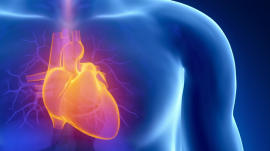
How is Heart Health Related to Sleep Health?
What if you could help stop one of the largest health crisis in the US by examining your patient’s airways?
Heart disease is the leading cause of death in the US, causing 610,000 (1 in 4) deaths a year. A hidden but major contributor to this statistic is a condition that goes undiagnosed, can affect anyone, and may, in fact, be treated with the help of a dental professional, as we’ve discussed before (link).
Obstructive sleep apnea (OSA) occurs when an obstruction in the airway prevents a patient from getting enough air at night, causing them to receive less oxygen and sleep than needed. Make no mistake, there’s abundant evidence that OSA can be a fatal condition if left untreated. It’s estimated to kill around 450,000 Americans every year, with the National Commission on Sleep Disorders Research estimating OSA to cause 38,000 cardiovascular deaths a year. A condition with such a close connection to a disease that impacts every family in America shouldn’t be ignored.
OSA is a well-known cause of serious, possibly fatal heart conditions such as chronic hypertension, coronary artery disease, atherosclerosis (fatty deposits in the aorta) and even congestive heart failure, just to name a few. Studies suggest that OSA can increase the risk of heart failure by 140%, the risk of stroke by 60%, and the risk of coronary heart disease by 30%. Experts suggest that sleep apnea has such an impact on the heart due to the stress of not getting enough oxygen at night, working harder than it should, causing an enlarged heart and inflamed aortas.
What Can They Do About It?
As cardiac disease may be the biggest immediate concern for an OSA patient, some basic things they can start immediately to maintain heart health would be:
-Stick to your OSA treatment plan. Improving your sleep WILL help to reverse heart issues.
-Exercise and adopt healthier eating habits (losing weight can even help to reverse your OSA condition in addition to strengthening your heart).
– Heart attacks are five to six times more likely to occur in the early morning hours (between 4 and 10am). Taking aspirin and drinking water before bed may prevent this.
-Limit alcohol consumption.
Of course, everyone should consult their physician before starting an exercise regimen or drastically changing their diet. Examining your patient’s airway, however, can in fact be the key to improving their health in the long term and even keep people from a sudden and preventable death.
References:
- Heart Disease. (2017, November 28). Retrieved from CDC.
- Jean-Louis, G., Brown, C. D., Zizi, F., Ogedegbe, G., Boutin-Foster, C., Gorga, J., & McFarlane, S. I. (2010, July). Cardiovascular disease risk reduction with sleep apnea treatment. Retrieved from NCBI.
- Jean-Louis, G., Zizi, F., Clark, L. T., Brown, C. D., & McFarlane, S. I. (2008, June 15). Obstructive Sleep Apnea and Cardiovascular Disease: Role of the Metabolic Syndrome and Its Components. Retrieved from NCBI.

